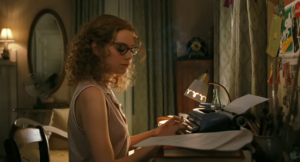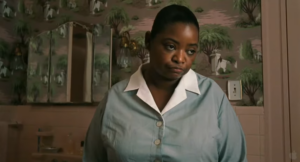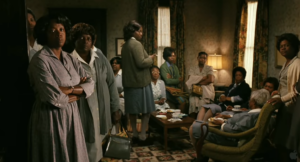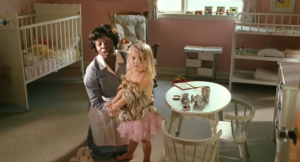Rating: 3 out of 5



Recently, I watched The Help. I was very excited to watch it because of the simple fact that Octavia Spencer won the Academy Award for Best Supporting Actress for her role. It not often that a black person wins the Academy Award. I told my mom I was about to watch it, and she said that my aunt walked out of the film. That didn’t put me off because I wanted to see how Octavia Spencer won her award. I’m letting you know now that this film is a disgrace for black women and the thought of black women needing the white savior to come in and give them strength. I’m trying to not become too political, but this film is downright BLAH!!

The film is set in the 1960s in Jackson, Mississippi. Can’t get much southerner than Mississippi. Skeeter Phelan (Stone) is an aspiring writer who has graduated from college and returns to her home after finding a job writing in a futile newspaper column in the local newspaper. Let’s hold up for a second and appreciate the name, Skeeter. If that isn’t a southern nickname, I don’t know what is. Skeeter arrives home and learns that her nanny and family’s maid Constantine Jefferson is gone. This news saddens her greatly as her mother evades answering why she isn’t around. Skeeter calls an editor who states if she can find a story worth writing, she would think about publishing it. Skeeter watches from the sideline how her “friends” treat the black or, as they call them, the help. Skeeter sees the chance of writing a book about the relationship of the black maids with Southern society. She convinces Aibileen Clark (Davis) to tell her story. Minny Jackson (Spencer) also jumps into telling her story as she has been unfairly fired by the arrogant Hilly Holbrook (Howard), who is a leader in the racist high society. As word spreads, more and more maids accept being interviewed by Skeeter to tell their story. Through the way, Skeeter begins to appreciate the women’s story and finds out about her own maid. When the book “The Help” is released, the once high society turns upside down.
The first aspect of the film I really want to talk about is the acting of three people: Viola Davis, Octavia Spencer, and Jessica Chastain. They were the only decent aspect of this film. Viola Davis as Aibileen Clark was sincere and heartwarming. A person that had to do her job but also found the courage to tell her story. She could’ve explained it more, but then I remember the time she lived in, and it was dangerous for what she did. Davis is an absolute pleasure to watch.

Octavia Spencer, as Minny Jackson, is fantastic in this role. I really enjoyed her and her sassy, tell it how it is was. Oh, how she got back Bryce Dallas Howard’s character with that pie is phenomenal. I am happy that a sista won the Academy Award because there are so few. Spencer deserved this award because I know it wasn’t easy to play a role like this.
Jessica Chastain as Celia Rae Foote was refreshing. She was also one of my favorite characters because she seemed genuinely a caring person who saw past color and saw a person. She was an outsider in her own community, and it sucks because she was just looking for friendship. Not her fault. She is hotter than all those other evil bitches. Chastain was delightful and full of life, which was very refreshing in this fil.

With that out of the way, let me once again state that this movie is a freakin joke! If it shows how strong black women are, it didn’t. What is shown was black women raising white kids for people that shouldn’t even have children. Yet, the women walk around all high and mighty because of their times and how society was back then. Can’t use the same bathroom or having an outhouse built for you in the back. Having people talk about you like you’re not even a person, and yet you have to behave and just smile. It is very frustrating to watch.
This film also has the white savior complex about it. The only way for black women to have a voice and even find their voice is when a white person comes along and shows them the way. That they had no help and only through them is their voice finally heard. Excuse me? Sistas really don’t need this, and they will tell you how it is and then some.

Also, this film shows the lack of parenting in “high class” white society. It shows that maybe you shouldn’t have kids, but also you don’t even know how to raise your own damn kids. That the one person who truly cared for the raising of the kids was the maids.
Now, not all is bad with this film. It does present amusing parts. Once again, when Minny gives her pie, that is beyond hilarious but also one that makes you think and quite a twist. I got a great laugh when all those toilets ended up on that one woman’s front yard. That was a fantastic moment. Honestly, the relationship between Minny and Celia was adorable and touching to watch. Well, the party where Hilly’s mom laughs her butt off is also funny.
Speaking of Sissy Spacek, she was also a breath of relief in this film. She was that mom that drank and watched from the sidelines. I don’t know if she thought the way her daughter thought, but she seemed to respect Minny and find the ultimate joy when her daughter secret was put on blast for everyone to see.
My aunt walked out of the theater while watching this film. I was frustrated while watching this film, but it does have some decent moments. Will I ever watch this film again? Probably not because there are far better movies that have Viola Davis and Octavia Spencer along with showing black pride.